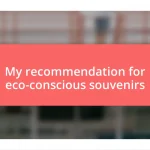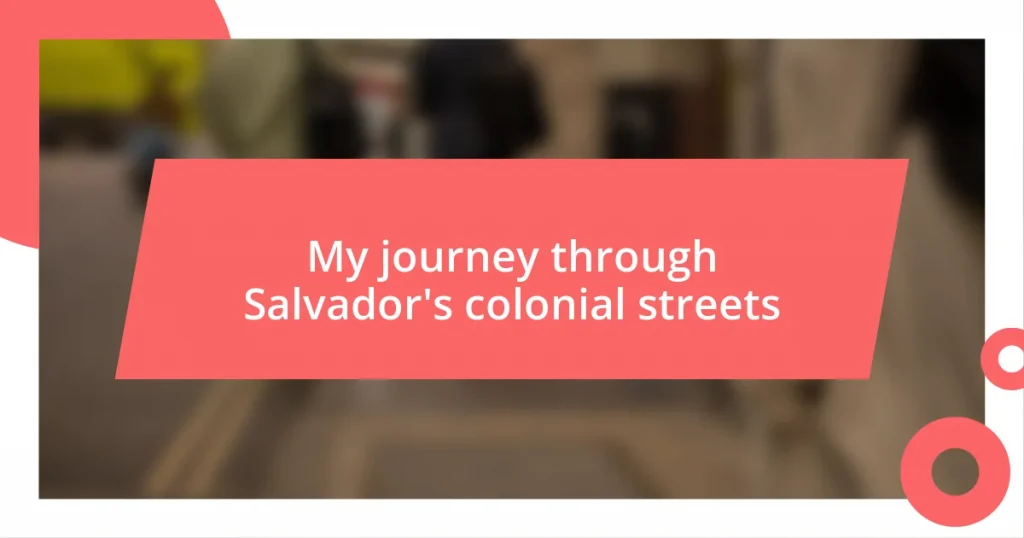Key takeaways:
- Responsible travel choices enhance personal experiences while positively impacting local communities and the environment.
- Key benefits of responsible travel include cultural exchange, economic support, and environmental preservation, making travel more meaningful.
- Minimizing carbon footprints through public transport, eco-friendly activities, and supporting local economies enriches travel and promotes sustainability.
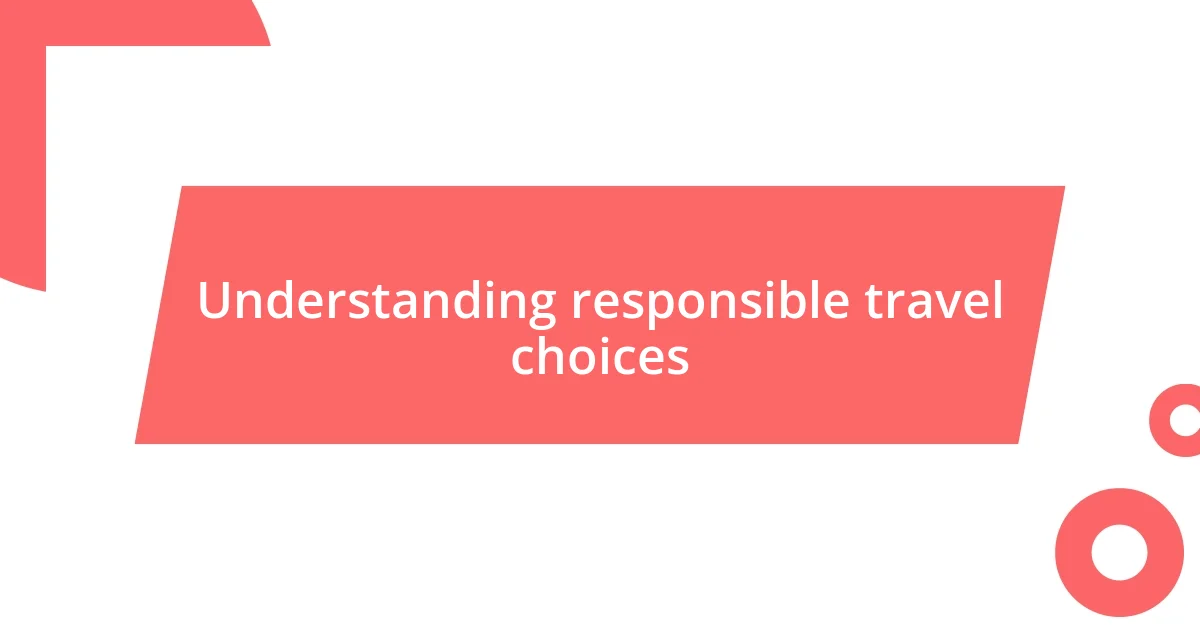
Understanding responsible travel choices
Responsible travel choices are all about making conscious decisions that benefit not only our personal experiences but also the communities we visit. I remember traveling to a small village in Thailand and choosing a local homestay over a big resort. It was an eye-opening experience that allowed me to really connect with local culture, and the warm hospitality I received taught me the value of supporting families who rely on tourism for their livelihood.
When I think about responsible travel, it often stirs an emotional response. I can’t help but reflect on how my actions can impact the environment and the local economy. Have you ever considered how a simple decision to use public transport instead of taxis can lessen your carbon footprint? Each small choice adds up, creating a ripple effect that contributes to global sustainability.
It’s important to recognize that responsible travel isn’t just a trend; it’s a mindset shift. I once made a trip where I participated in a beach clean-up, and it was both humbling and rewarding to see how collective efforts can restore nature. How often do we stop to think about the legacy we leave behind with our travels? Understanding the broader implications of our choices elevates our travel experiences into something more meaningful.
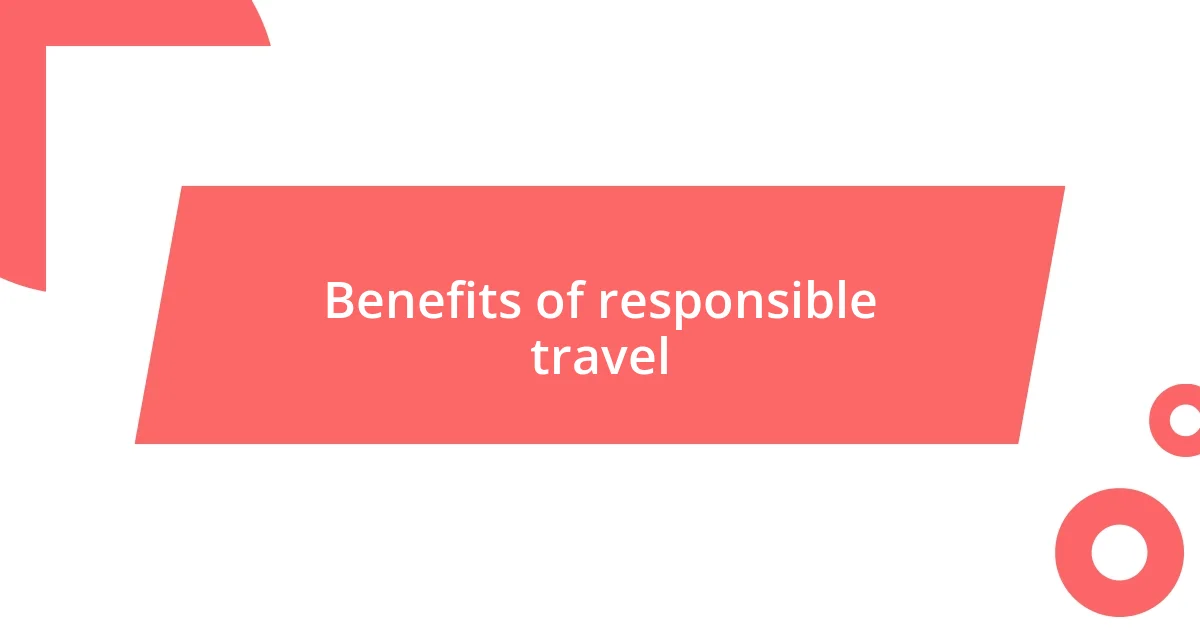
Benefits of responsible travel
Responsible travel not only enriches our own experiences but also fosters a positive impact on the places we visit. I remember hiking in a national park and opting to join a local guide instead of just going solo. Not only did I gain insightful stories about the flora and fauna, but I also supported a family-run business that truly values the preservation of their environment. This kind of travel creates a win-win situation where tourists enjoy unique perspectives, and local communities thrive economically.
Here are some key benefits of responsible travel:
- Cultural Exchange: Engaging with locals helps preserve traditions and fosters mutual understanding.
- Environmental Preservation: Choosing eco-friendly activities reduces our footprint and protects natural habitats.
- Economic Support: Money spent on local businesses contributes directly to the community’s welfare.
- Personal Growth: Responsible choices often lead to enriching experiences, allowing us to learn and grow from different cultures.
- Sustainable Practices: Supporting eco-friendly methods encourages communities to develop sustainable tourism practices.
When I reflect on my travels, I realize that each conscious decision enhances not just my journey but also the world around me. The joy I felt when I selected a locally sourced meal during my last trip reinforces the idea that such choices can create a lasting impact, helping preserve both culture and environment for future generations.

Planning eco-friendly itineraries
When I’m planning eco-friendly itineraries, I prioritize destinations that are committed to sustainability. I remember researching a spot in Costa Rica known for its eco-lodges. By choosing accommodations that practice conservation, I felt a sense of camaraderie with fellow travelers who share similar values. This wasn’t just a stay for me; it was a way to contribute to preserving delicate ecosystems while enjoying nature’s beauty.
I find that weaving local experiences into my travel plans enhances both the journey and my connection with the environment. For example, I once took a guided bicycle tour through vineyards in Italy instead of a car trip. Pedaling through scenic landscapes not only reduced my carbon footprint but also allowed me to absorb the sights and sounds in a way that driving never could. Have you ever thought about how the mode of transport can shape your travel experience?
Furthermore, mapping out an eco-friendly itinerary often involves selecting activities that support local conservation efforts. I recall joining a tree-planting project during my travels, which felt incredibly fulfilling. It was rewarding to know my efforts would help restore a forest while creating bonds with other travelers. These experiences remind me that responsible travel is about creating memories that align with my values while nurturing the places I adore.
| Eco-Friendly Planning Tips | Personal Experience |
|---|---|
| Choose eco-accommodations | Staying in a solar-powered lodge in Costa Rica enriched my experience and aligned with my values. |
| Opt for local experiences | Joining a bike tour in Italy allowed me to engage closely with the landscape and the local community. |
| Support conservation activities | Participating in a tree-planting project made me feel connected to the environment and other eco-conscious travelers. |
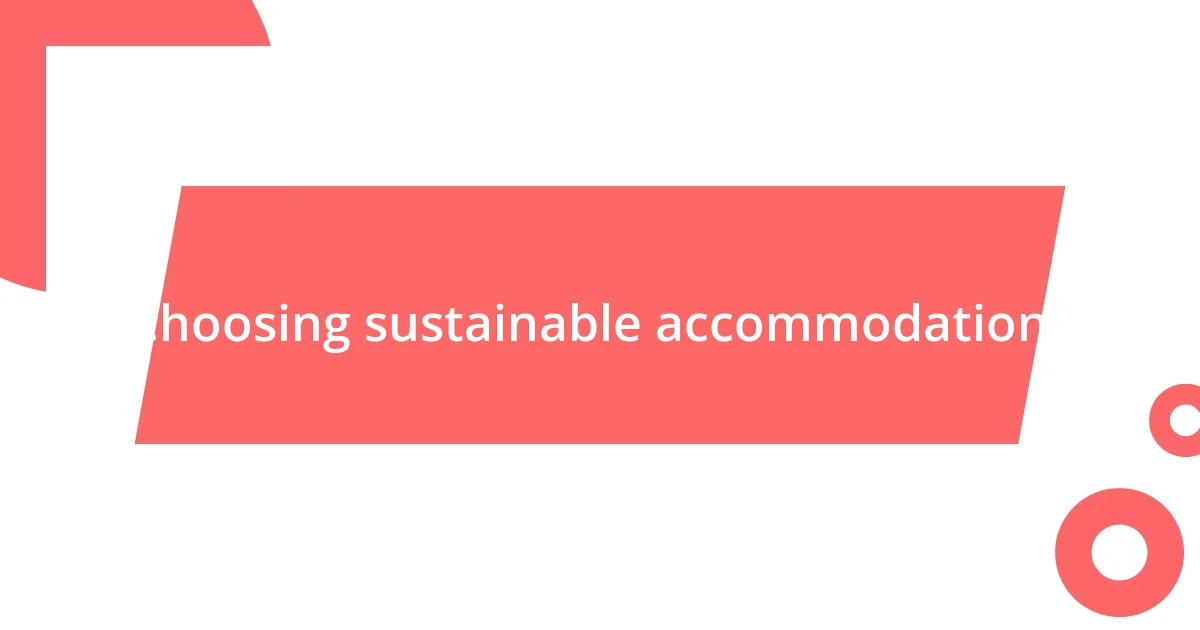
Choosing sustainable accommodations
Selecting sustainable accommodations is one of the most impactful choices a traveler can make. During my stay at an eco-friendly resort in Thailand, I was completely immersed in practices aimed at preserving the surrounding rainforest. The showers used recycled water, and I felt an overwhelming sense of peace knowing that even small efforts could help protect such a vibrant ecosystem. Have you ever considered how your lodging choices can contribute to environmental conservation?
Whenever I book a place to stay, I make it a point to look for certifications like LEED or Green Key. I remember feeling an invigorating sense of pride when I stayed at a hotel that is not only locally owned but also actively involved in community projects. The genuine warmth from the staff—who shared their stories about the hotel’s sustainability initiatives—made my experience even more memorable. I often wonder how many travelers realize the profound connection between their accommodations’ practices and the well-being of local communities.
Furthermore, it’s essential to consider the everyday practices of these accommodations, such as reducing plastic waste and sourcing food locally. I was fascinated when I discovered that the restaurant in my hotel harvested herbs and vegetables from its own garden. The taste of those fresh ingredients brought me joy, reminding me of the importance of supporting local ecosystems. How often do we think about where our food comes from while traveling? Making informed choices about where I stay has deepened my appreciation for the world around me, transforming my travels into a meaningful experience.
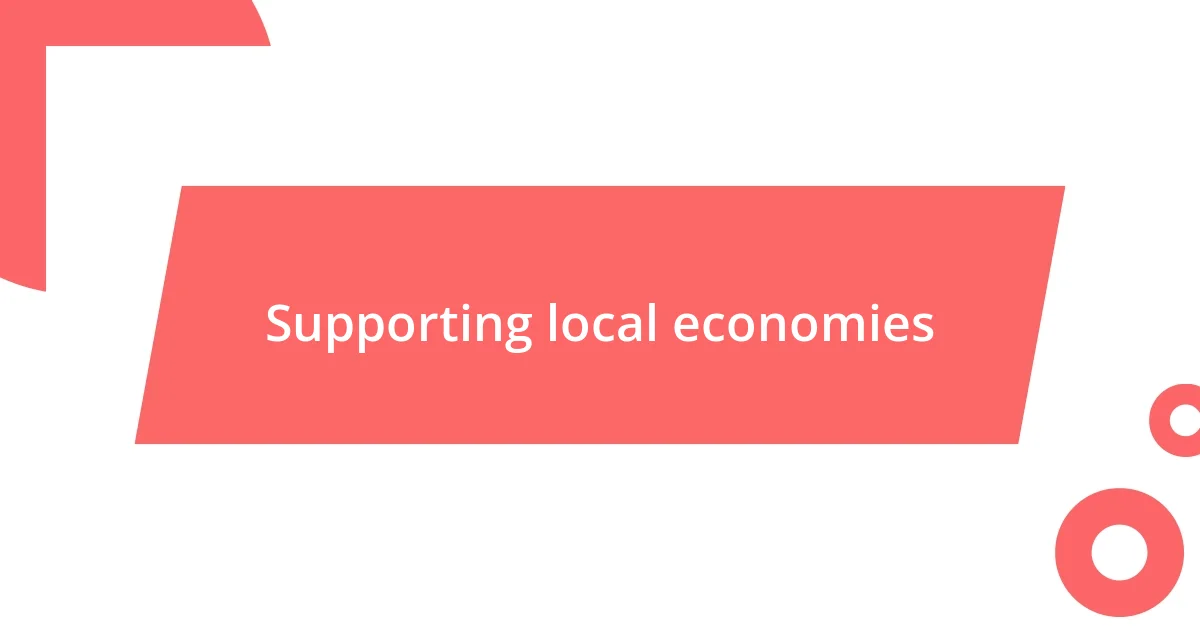
Supporting local economies
Supporting local economies can be one of the most rewarding aspects of travel. I vividly recall wandering through a bustling market in Morocco, surrounded by handmade crafts and fresh produce. Each item felt like a small piece of the community’s culture, and knowing that my purchases would help local artisans thrive made shopping feel like a meaningful exchange rather than a mere transaction. Have you ever experienced the joy of finding the perfect souvenir that directly supports the person who made it?
Eating at locally-owned restaurants is another fantastic way to contribute. I remember dining at a charming eatery in a small village in Greece, where the owner shared stories about his family’s recipes passed down through generations. The food was not only authentically delicious but also supported local farmers. It made me think about how choosing a local meal can have a ripple effect, boosting the community’s economy and preserving culinary traditions. How often do we consider our meals as a form of cultural appreciation?
Additionally, engaging in activities run by local guides often enriches the travel experience while benefiting the economy. On a hiking trip in the Andes, I hired a local guide whose passion for the land and culture was infectious. Listening to his stories about the region deepened my connection to its history and made me realize that my choice to hire him supported his family directly. It’s a powerful reminder: by choosing local, we don’t just travel—we weave ourselves into the fabric of the places we visit.
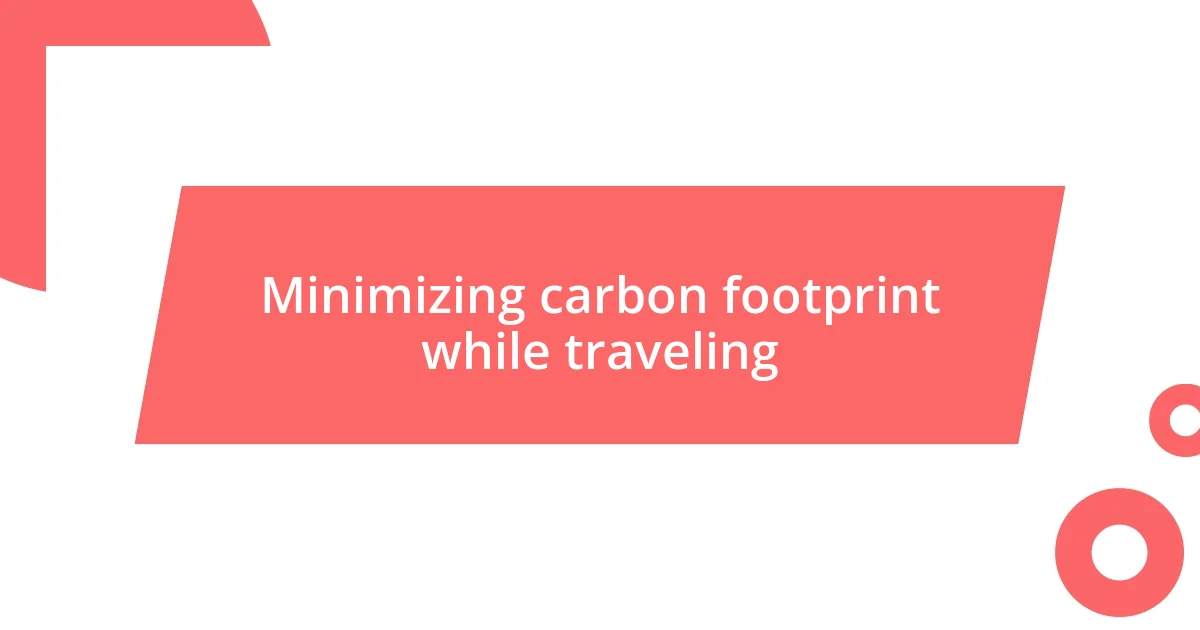
Minimizing carbon footprint while traveling
When it comes to minimizing our carbon footprint while traveling, I’ve found that opting for public transportation can make a substantial difference. During my recent trip to Japan, I relied on the extensive train system, and honestly, it was an adventure in itself! The thrill of zipping past landscapes while knowing I was reducing my carbon emissions felt incredibly rewarding. Have you ever considered how much more you can see and experience when you leave the car behind?
I’ve also discovered that choosing eco-friendly activities has a profound impact. On a kayaking trip in Croatia, I experienced the breathtaking beauty of nature from a unique perspective, all while leaving only gentle ripples in the water. Being out on the sea, surrounded by picturesque shores, made me reflect on the importance of engaging with the environment in a sustainable way. It’s fascinating to think about how our choices reflect our values—are we leaving a positive impact or just taking from the places we visit?
Lastly, I consistently look for ways to offset my travel emissions. For instance, after a long-haul flight, I once donated to a reforestation project that planted trees in areas affected by deforestation. It gave me a sense of purpose, knowing that my travel was contributing to the healing of our Earth. Have you explored how you can balance your adventures with the necessity to care for our planet? Finding ways to give back not only enriches the travel experience but helps mitigate the environmental impact of our journeys.











